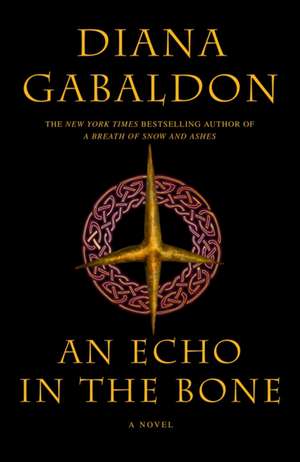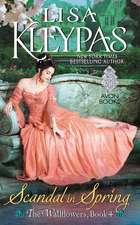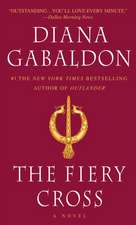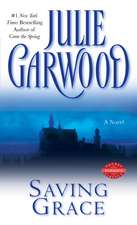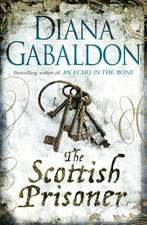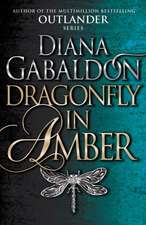An Echo in the Bone
Autor Diana Gabaldonen Limba Engleză Hardback – 31 aug 2009
Jamie Fraser, former Jacobite and reluctant rebel, is already certain of three things about the American rebellion: The Americans will win, fighting on the side of victory is no guarantee of survival, and he’d rather die than have to face his illegitimate son–a young lieutenant in the British army–across the barrel of a gun.
Claire Randall knows that the Americans will win, too, but not what the ultimate price may be. That price won’t include Jamie’s life or his happiness, though–not if she has anything to say about it.
Meanwhile, in the relative safety of the twentieth century, Jamie and Claire’s daughter, Brianna, and her husband, Roger MacKenzie, have resettled in a historic Scottish home where, across a chasm of two centuries, the unfolding drama of Brianna’s parents’ story comes to life through Claire’s letters. The fragile pages reveal Claire’s love for battle-scarred Jamie Fraser and their flight from North Carolina to the high seas, where they encounter privateers and ocean battles–as Brianna and Roger search for clues not only to Claire’s fate but to their own. Because the future of the MacKenzie family in the Highlands is mysteriously, irrevocably, and intimately entwined with life and death in war-torn colonial America.
With stunning cameos of historical characters from Benedict Arnold to Benjamin Franklin, An Echo in the Bone is a soaring masterpiece of imagination, insight, character, and adventure–a novel that echoes in the mind long after the last page is turned.
| Toate formatele și edițiile | Preț | Express |
|---|---|---|
| Paperback (4) | 61.60 lei 3-5 săpt. | +22.42 lei 5-11 zile |
| dell – 30 apr 2011 | 61.60 lei 3-5 săpt. | +22.42 lei 5-11 zile |
| Orion Publishing Group – 30 sep 2010 | 63.36 lei 3-5 săpt. | +43.59 lei 5-11 zile |
| Orion Publishing Group – 23 ian 2025 | 81.73 lei 3-5 săpt. | +51.60 lei 5-11 zile |
| Bantam – 31 mai 2010 | 109.15 lei 3-5 săpt. | +33.60 lei 5-11 zile |
| Hardback (1) | 238.26 lei 3-5 săpt. | |
| Delacorte Press – 31 aug 2009 | 238.26 lei 3-5 săpt. |
Preț: 238.26 lei
Nou
45.59€ • 47.72$ • 37.95£
Carte disponibilă
Livrare economică 10-24 martie
Specificații
ISBN-10: 0385342454
Pagini: 832
Dimensiuni: 155 x 239 x 51 mm
Greutate: 1.16 kg
Ediția:New.
Editura: Delacorte Press
Recenzii
—The Arizona Republic
From the Trade Paperback edition.
Notă biografică
Diana Gabaldon is the New York Times bestselling author of the wildly popular Outlander novels–Outlander, Dragonfly in Amber, Voyager, Drums of Autumn, The Fiery Cross, and A Breath of Snow and Ashes (for which she won a Quill Award and the Corine International Book Prize)–and one work of nonfiction, The Outlandish Companion, as well as the bestselling series featuring Lord John Grey, a character she introduced in Voyager. She lives in Scottsdale, Arizona.
Extras
Sometimes They’re Really Dead
Wilmington, colony of North Carolina
July 1776
The pirate’s head had disappeared. William heard the speculations from a group of idlers on the quay nearby, wondering whether it would be seen again.
“Na, him be gone for good,” said a ragged man of mixed blood, shaking his head. “De ally-gator don’ take him, de water will.”
A backwoodsman shifted his tobacco and spat into the water in disagreement.
“No, he’s good for another day—two, maybe. Them gristly bits what holds the head on, they dry out in the sun. Tighten up like iron. Seen it many a time with deer carcasses.”
William saw Mrs. MacKenzie glance quickly at the harbor, then away. She looked pale, he thought, and maneuvered himself slightly so as to block her view of the men and the brown flood of high tide, though since it was high, the corpse tied to its stake was naturally not visible. The stake was, though—a stark reminder of the price of crime. The pirate had been staked to drown on the mudflats several days before, the persistence of his decaying corpse an ongoing topic of public conversation.
“Jem!” Mr. MacKenzie called sharply, and lunged past William in pursuit of his son. The little boy, red-haired like his mother, had wandered away to listen to the men’s talk, and was now leaning perilously out over the water, clinging to a bollard in an attempt to see the dead pirate.
Mr. MacKenzie snatched the boy by the collar, pulled him in, and swept him up in his arms, though the boy struggled, craning back toward the swampish harbor.
“I want to see the wallygator eat the pirate, Daddy!”
The idlers laughed, and even MacKenzie smiled a little, though the smile disappeared when he glanced at his wife. He was at her side in an instant, one hand beneath her elbow.
“I think we must be going,” MacKenzie said, shifting his son’s weight in order better to support his wife, whose distress was apparent. “Lieutenant Ransom—Lord Ellesmere, I mean”—he corrected with an apologetic smile at William—“will have other engagements, I’m sure.”
This was true; William was engaged to meet his father for supper. Still, his father had arranged to meet him at the tavern just across the quay; there was no risk of missing him. William said as much, and urged them to stay, for he was enjoying their company—Mrs. MacKenzie’s, particularly—but she smiled regretfully, though her color was better, and patted the capped head of the baby in her arms.
“No, we do have to be going.” She glanced at her son, still struggling to get down, and William saw her eyes flicker toward the harbor and the stark pole that stood above the flood. She resolutely looked away, fixing her eyes upon William’s face instead. “The baby’s waking up; she’ll be wanting food. It was so lovely to meet you, though. I wish we might talk longer.” She said this with the greatest sincerity, and touched his arm lightly, giving him a pleasant sensation in the pit of the stomach.
The idlers were now placing wagers on the reappearance of the drowned pirate, though by the looks of things, none of them had two groats to rub together.
“Two to one he’s still there when the tide goes out.”
“Five to one the body’s still there, but the head’s gone. I don’t care what you say about the gristly bits, Lem, that there head was just a-hangin’ by a thread when this last tide come in. Next un’ll take it, sure.”
Hoping to drown this conversation out, William embarked on an elaborate farewell, going so far as to kiss Mrs. MacKenzie’s hand with his best court manner—and, seized by inspiration, kissed the baby girl’s hand, too, making them all laugh. Mr. MacKenzie gave him rather an odd look, but didn’t seem offended, and shook his hand in a most republican manner—playing out the joke by setting down his son and making the little boy shake hands as well.
“Have you kilt anybody?” the boy inquired with interest, looking at William’s dress sword.
“No, not yet,” William replied, smiling.
“My grandsire’s kilt two dozen men!”
“Jemmy!” Both parents spoke at once, and the little boy’s shoulders went up around his ears.
“Well, he has!”
“I’m sure he is a bold and bloody man, your grandsire,” William assured the little boy gravely. “The King always has need of such men.”
“My grandda says the King can kiss his arse,” the boy replied matter- of-factly.
“JEMMY!”
Mr. MacKenzie clapped a hand over his outspoken offspring’s mouth.
“You know your grandda didn’t say that!” Mrs. MacKenzie said. The little boy nodded agreeably, and his father removed the muffling hand.
“No. Grannie did, though.”
“Well, that’s somewhat more likely,” Mr. MacKenzie murmured, obviously trying not to laugh. “But we still don’t say things like that to soldiers—they work for the King.”
“Oh,” said Jemmy, clearly losing interest. “Is the tide going out now?” he asked hopefully, craning his neck toward the harbor once more.
“No,” Mr. MacKenzie said firmly. “Not for hours. You’ll be in bed.”
Mrs. MacKenzie smiled at William in apology, her cheeks charmingly flushed with embarrassment, and the family took its leave with some haste, leaving William struggling between laughter and dismay.
“Oy, Ransom!”
He turned at his name, to find Harry Dobson and Colin Osborn, two second lieutenants from his regiment, evidently escaped from duty and eager to sample the fleshpots of Wilmington—such as they were.
“Who’s that?” Dobson looked after the departing group, interested.
“A Mr. and Mrs. MacKenzie. Friends of my father’s.”
“Oh, married, is she?” Dobson sucked in his cheeks, still watching the woman. “Well, make it a bit harder, I suppose, but what’s life without a challenge?”
“Challenge?” William gave his diminutive friend a jaundiced look. “Her husband’s roughly three times your size, if you hadn’t noticed.”
Osborn laughed, going red in the face.
“She’s twice his size! She’d crush you, Dobby.”
“And what makes you think I mean to be on the bottom?” Dobson inquired with dignity. Osborn hooted.
“What’s this obsession of yours with giantesses?” William demanded. He glanced at the little family, now nearly out of sight at the end of the street. “That woman’s nearly as tall as I am!”
“Oh, rub it in, why don’t you?” Osborn, who was taller than Dobson’s five feet, but still a head shorter than William, aimed a mock kick at his knee. William dodged it and cuffed Osborn, who ducked and shoved him into Dobson.
“Gennelmen!” The menacing cockney tones of Sergeant Cutter brought them up sharp. They might outrank the sergeant, but not one of them would have the nerve to point this out. The entire battalion went in fear of Sergeant Cutter, who was older than God and approximately Dobson’s height, but who contained within his diminutive physique the sheer fury of a full-sized volcano on the boil.
“Sergeant!” Lieutenant William Ransom, Earl of Ellesmere and senior of the group, drew himself up straight, chin pressed back into his stock. Osborn and Dobson hastily followed his lead, quaking in their boots.
Cutter strode back and forth in front of them, in the manner of a stalking leopard. You could just see the lashing tail and the preliminary licking of chops, William thought. Waiting for the bite was almost worse than getting it in the arse.
“And where’s your troops, then?” Cutter snarled. “Sirs?”
Osborn and Dobson at once began sputtering explanations, but Lieutenant Ransom—for once—walked on the side of the angels.
“My men are guarding the Governor’s Palace, under Lieutenant Colson. I’m given leave, Sergeant, to dine with my father,” he said respectfully. “By Sir Peter.”
Sir Peter Packer’s was a name to conjure with, and Cutter abated in mid-spew. Rather to William’s surprise, though, it wasn’t Sir Peter’s name that had produced this reaction.
“Your father?” Cutter said, squinting. “That’s Lord John Grey, is it?”
“Er . . . yes,” William replied cautiously. “Do you . . . know him?”
Before Cutter could reply, the door of a nearby tavern opened, and William’s father came out. William smiled in delight at this timely appearance, but quickly erased the smile as the sergeant’s gimlet gaze fixed on him.
“Don’t you be a-grinnin’ at me like an ’airy hape,” the sergeant began, in dangerous tones, but was interrupted by Lord John’s clapping him familiarly on the shoulder—something none of the three young lieutenants would have done if offered significant money.
“Cutter!” Lord John said, smiling warmly. “I heard those dulcet tones and said to myself, why damn me if it isn’t Sergeant Aloysius Cutter! There can’t be another man alive who sounds so much like a bulldog that’s swallowed a cat and lived to tell about it.”
“Aloysius?” Dobson mouthed at William, but William merely grunted briefly in response, unable to shrug, as his father had now turned his attention in his direction.
“William,” he said, with a cordial nod. “How very punctual you are. My apologies for being so late; I was detained.” Before William could say anything or introduce the others, though, Lord John had embarked upon a lengthy reminiscence with Sergeant Cutter, reliving high old times on the Plains of Abraham with General Wolfe.
This allowed the three young officers to relax slightly, which, in Dobson’s case, meant a return to his earlier train of thought.
“You said that red-haired poppet’s a friend of your father’s?” he whispered to William. “Find out from him where she’s staying, eh?”
“Idiot,” hissed Osborn. “She isn’t even pretty! She’s long-nosed as—as —as Willie!”
“Didn’t see as high as her face,” Dobson said, smirking. “Her tits were right at eye-level, though, and those . . .”
“Ass!”
“Shh!” Osborn stamped on Dobson’s foot to shut him up as Lord John turned back to the young men.
“Will you introduce me to your friends, William?” Lord John inquired politely. Rather red in the face—he had reason to know that his father had acute hearing, despite his artillery experiences—William did so, and Osborn and Dobson both bowed, looking rather awed. They hadn’t realized who his father was, and William was at once proud that they were impressed, and mildly dismayed that they’d discovered Lord John’s identity—it would be all over the battalion before supper tomorrow. Not that Sir Peter didn’t know, of course, but—
He gathered his wits, realizing that his father was taking leave for them both, and returned Sergeant Cutter’s salute, hastily but in good form, before hurrying after his father, leaving Dobby and Osborn to their fate.
“I saw you speaking to Mr. and Mrs. MacKenzie,” Lord John said casually. “I trust they are well?” He glanced down the quay, but the MacKenzies had long since disappeared from view.
“Seemed so,” Willie said. He was not going to ask where they stayed, but the impression the young woman had made on him lingered. He couldn’t say if she was pretty or not; her eyes had struck him, though —a wonderful deep blue with long auburn lashes, and fixed on him with a flattering intensity that had warmed the cockles of his heart. Grotesquely tall, of course, but—what was he thinking? The woman was married—with children! And red-haired, to boot.
“You’ve—er—known them long?” he asked, thinking of the startlingly perverse political sentiments that evidently flourished in the family.
“Quite some time. She is the daughter of one of my oldest friends, Mr. James Fraser. Do you recall him, by chance?”
William frowned, not placing the name—his father had thousands of friends, how should he . . .
“Oh!” he said. “Not an English friend, you don’t mean. Was it not a Mr. Fraser that we visited in the mountains, that time when you fell sick of the—of the measle?” The bottom of his stomach dropped a little, remembering the sheer terror of that time. He had traveled through the mountains in a daze of misery; his mother had died only a month before. Then Lord John had caught the measle, and William had been sure that his father was about to die likewise, leaving him completely alone in the wilderness. There hadn’t been room for anything in his mind but fear and grief, and he retained only a jumble of confused impressions from the visit. He had some dim recollection that Mr. Fraser had taken him fishing and been kind to him.
“Yes,” his father said, with a sidelong smile. “I’m touched, Willie. I should have thought you might recall that visit more because of your own misadventure than mine.”
“Mis—” Memory rushed over him, succeeded by a flood of heat, hotter than the humid summer air. “Thanks very much! I’d managed to expunge that from my memory, until you mentioned it!”
His father was laughing, and making no attempt to hide it. In fact, he was convulsed.
“I’m sorry, Willie,” he said, gasping and wiping his eyes with a corner of his handkerchief. “I can’t help it; it was the most—the most —oh, God, I’ll never forget what you looked like when we pulled you out of that privy!”
“You know it was an accident,” William said stiffly. His cheeks burned with remembered mortification. At least Fraser’s daughter hadn’t been present to witness his humiliation at the time.
“Yes, of course. But—” His father pressed the handkerchief to his mouth, his shoulders shaking silently.
“Feel free to stop cackling at any point,” William said coldly. “Where the devil are we going, anyway?” They’d reached the end of the quay, and his father was leading them—still snorting like a grampus— into one of the quiet, tree-lined streets, away from the taverns and inns near the harbor.
“We’re dining with a Captain Richardson,” his father said, controlling himself with an obvious effort. He coughed, blew his nose, and put away the handkerchief. “At the house of a Mr. Bell.”
Mr. Bell’s house was whitewashed, neat, and prosperous, without being ostentatious. Captain Richardson gave much the same sort of impression: of middle age, well-groomed and well-tailored, but without any notable style, and with a face you couldn’t pick out of a crowd two minutes after seeing it.
The two Misses Bell made a much stronger impression, particularly the younger, Miriam, who had honey-colored curls peeping out of her cap, and big, round eyes that remained fixed on William throughout dinner. She was seated too far away for him to be able to converse with her directly, but he fancied that the language of the eyes was sufficient to indicate to her that the fascination was mutual, and if an opportunity for more personal communication should offer later . . . ? A smile, and a demure lowering of honey-colored lashes, followed by a quick glance toward a door that stood open to the side porch, for air. He smiled back.
“Do you think so, William?” his father said, loudly enough to indicate that it was the second time of asking.
“Oh, certainly. Um . . . think what?” he asked, since it was after all Papa, and not his commander. His father gave him the look that meant he would have rolled his eyes had they not been in public, but replied patiently.
Descriere
Diana Gabaldon’s brilliant storytelling has captivated millions of readers in her bestselling and award-winning Outlander saga. Now, in An Echo in the Bone, the enormously anticipated seventh volume, Gabaldon continues the extraordinary story of the eighteenth-century Scotsman Jamie Fraser and his twentieth-century time-traveling wife, Claire Randall.
Jamie Fraser, former Jacobite and reluctant rebel, is already certain of three things about the American rebellion: The Americans will win, fighting on the side of victory is no guarantee of survival, and he’d rather die than have to face his illegitimate son–a young lieutenant in the British army–across the barrel of a gun.
Claire Randall knows that the Americans will win, too, but not what the ultimate price may be. That price won’t include Jamie’s life or his happiness, though–not if she has anything to say about it.
Meanwhile, in the relative safety of the twentieth century, Jamie and Claire’s daughter, Brianna, and her husband, Roger MacKenzie, have resettled in a historic Scottish home where, across a chasm of two centuries, the unfolding drama of Brianna’s parents’ story comes to life through Claire’s letters. The fragile pages reveal Claire’s love for battle-scarred Jamie Fraser and their flight from North Carolina to the high seas, where they encounter privateers and ocean battles–as Brianna and Roger search for clues not only to Claire’s fate but to their own. Because the future of the MacKenzie family in the Highlands is mysteriously, irrevocably, and intimately entwined with life and death in war-torn colonial America.
With stunning cameos of historical characters from Benedict Arnold to Benjamin Franklin, An Echo in the Bone is a soaring masterpiece of imagination, insight, character, and adventure–a novel that echoes in the mind long after the last page is turned.
